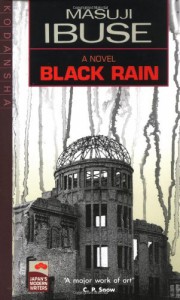100
Followers
21
Following
Parrish Lantern's Casebook
Malt Whisky Drinking, Single Speed Bike Racing, Poetry Loving, Book-Fiend, & If This Makes Me Seem Cool, It's All In The Edit.
~~~
The Ideal Library Symbolizes Everything a Society stands for. A Society Depends On Its Libraries To Know Who it Is, Because Libraries Are Societies Memory (A. Manguel). This Is My Attempt To Construct My Ideal library.
Black Rain: A Novel (Japans Modern Writers)
 This book started as a serialization in the magazine Shincho (Shinchosha Publishing Co, Ltd) in January 1965. Masuji Ibuse used historical records and the diaries of survivors to reconstruct the experience of the devastation caused by the atomic bombing of Hiroshima.Black Rain switches between the time & immediate aftermath of the bombing, covering the timeframe August the 6th to the 15th (1945) via the main protagonist, Shigematsu Shizuma’ s diary entries and the present (several years after).The book opens with Shigematsu’s concerns with his niece, Yasuko and her three failed marriage matches, the reason for which seems to be due to rumours about her health and whether she was exposed to the “Black Rain” fallout from the atomic bomb. In fact Shigematsu compiles a journal with the express aim of proving that she couldn’t have been exposed and thus didn’t have radiation sickness. We soon learn she has. *Although the translator John Bester, posits this book firmly within the tradition of the I-Novel (私小説 Shishōsetsu, Watakushi shōsetsu), the narrator is not Masuji Ibuse, but the primary protagonist Shigematsu, through whom we follow a period of his life as though it were laid out for our inspection – Shigematsu’s original reasoning for his journal is to prove his niece hadn’t come into contact with the black rain. By having Shigematsu write out his journal, Ibuse in a clever move, has used the I- Novel tradition to portray a realistic view of the narrator’s world, allowing us to perceive his life during the moment of the blast and the consequences that followed in the days, months and years after. Ibuse also shows us other viewpoints, by weaving them through Shigematsu’s tale, we learn of other survivors, the hibakusha*, whether family members, neighbours or other characters he meets on his journey and via their tales we learn more about this point, this ground zero that will be forever rooted deep in this nations psyche.http://parrishlantern.blogspot.com/2012/02/black-rainmasuji-ibuse.html
This book started as a serialization in the magazine Shincho (Shinchosha Publishing Co, Ltd) in January 1965. Masuji Ibuse used historical records and the diaries of survivors to reconstruct the experience of the devastation caused by the atomic bombing of Hiroshima.Black Rain switches between the time & immediate aftermath of the bombing, covering the timeframe August the 6th to the 15th (1945) via the main protagonist, Shigematsu Shizuma’ s diary entries and the present (several years after).The book opens with Shigematsu’s concerns with his niece, Yasuko and her three failed marriage matches, the reason for which seems to be due to rumours about her health and whether she was exposed to the “Black Rain” fallout from the atomic bomb. In fact Shigematsu compiles a journal with the express aim of proving that she couldn’t have been exposed and thus didn’t have radiation sickness. We soon learn she has. *Although the translator John Bester, posits this book firmly within the tradition of the I-Novel (私小説 Shishōsetsu, Watakushi shōsetsu), the narrator is not Masuji Ibuse, but the primary protagonist Shigematsu, through whom we follow a period of his life as though it were laid out for our inspection – Shigematsu’s original reasoning for his journal is to prove his niece hadn’t come into contact with the black rain. By having Shigematsu write out his journal, Ibuse in a clever move, has used the I- Novel tradition to portray a realistic view of the narrator’s world, allowing us to perceive his life during the moment of the blast and the consequences that followed in the days, months and years after. Ibuse also shows us other viewpoints, by weaving them through Shigematsu’s tale, we learn of other survivors, the hibakusha*, whether family members, neighbours or other characters he meets on his journey and via their tales we learn more about this point, this ground zero that will be forever rooted deep in this nations psyche.http://parrishlantern.blogspot.com/2012/02/black-rainmasuji-ibuse.html



